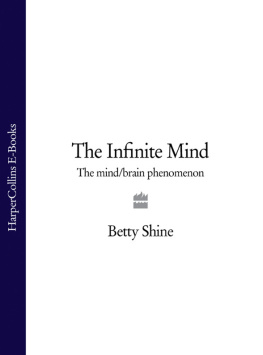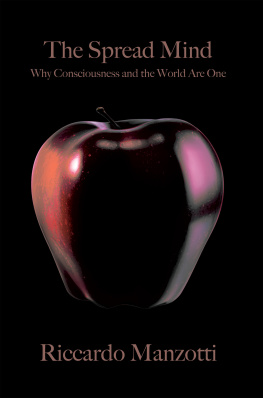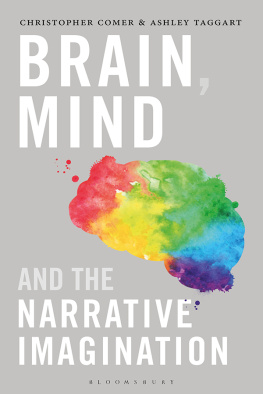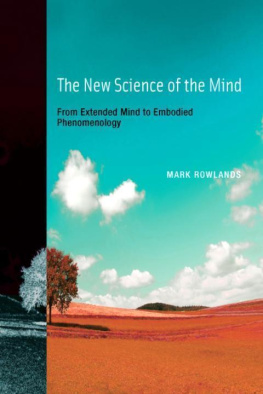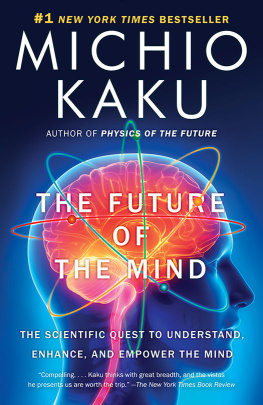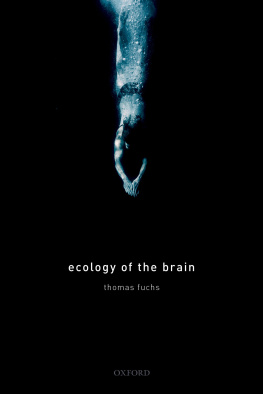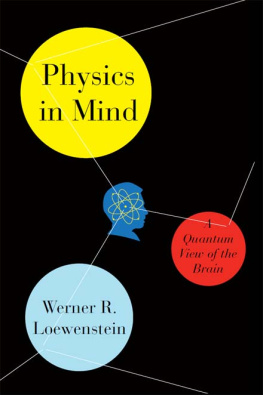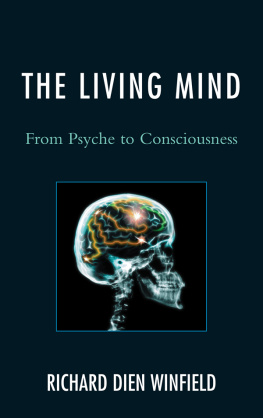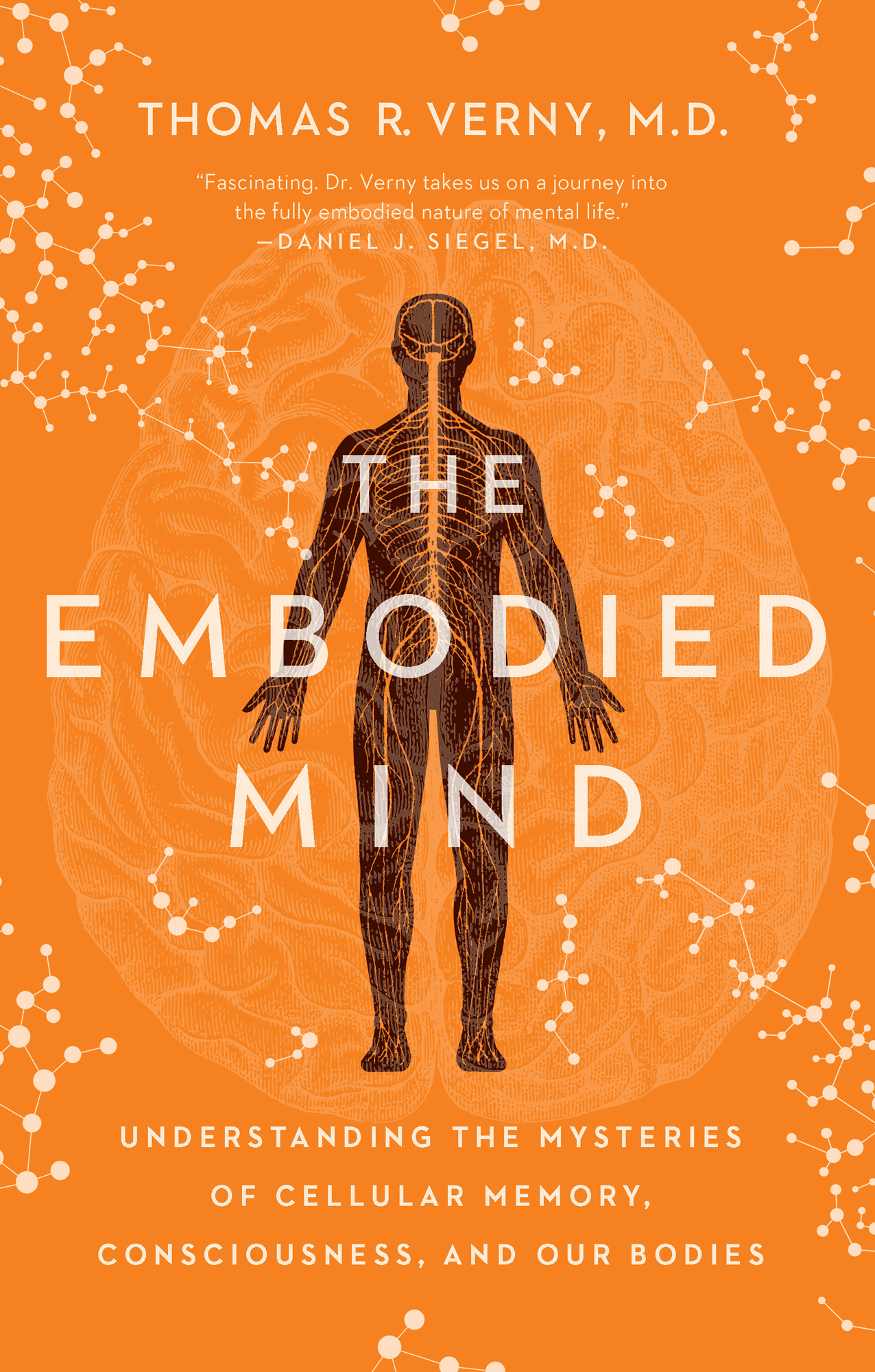Contents
Guide
Thomas R. Verny, M.D.
Fascinating. Dr. Verny takes us on a journey into the fully embodied nature of mental life.
Daniel J. Siegel, M.D.
The Embodied Mind
Understanding the Mysteries of Cellular Memory, Consciousness, and Our Bodies
To Sandra, my muse and my love
If we value the pursuit of knowledge, we must be free to follow wherever that search may lead us. The free mind is not a barking dog, to be tethered on a ten-foot chain.
Adlai E. Stevenson II
INTRODUCTION
A s a thirteen-year-old boy I read Sigmund Freuds The Interpretation of Dreams in the original German in Vienna. I was totally fascinated by how Freuds slow, methodical questioning eventually led to the discovery of deeply hidden unconscious conflicts in the lives of his patients. Then and there I resolved to become a psychiatrist.
Years later, when I had become a psychiatrist, I continued to be fascinated by dreams and the unconscious. One day, while working with a young man on his dream he suddenly, without any input from me, started to cry like a little baby. He cried for close to ten minutes and then stopped on his own. What just happened? I asked him. He told me that in his mind he found himself in a crib and that he was crying for his mother. Then, he recalled that he had actually seen photos of himself as an infant and some of them pictured him lying in a blue crib whereas the crib that he had just experienced was definitely white. He wondered about the discrepancy.
I suggested that he ask his mother to resolve this question. The next week he returned for his regular appointment and told me that according to his mother, when he was born his parents lacked money for a new crib but were able to borrow one from a neighbor. The borrowed crib was white. A few months later, they were able to buy a new crib for him and that new crib was blue. That is the one of which all the photos were taken.
I felt both intrigued and mystified by this experience, since throughout my studies first at the University of Toronto then Harvard University, I was taught that children remember nothing before the age of two. And yet as I continued to practice, I repeatedly encountered patients who would tell me about events in their lives reaching far back in time to infancy, birth, and even womb life. A few of these memories may have originated from overheard conversations by family members or gleaned from photo albums or videos. However, a considerable number would not have been easily available and were corroborated by evidence supplied by parents, hospital reports, and other documentation. I wondered how to explain these memories scientifically. It was then that after much study, research, and personal contacts with colleagues in obstetrics, psychology, psychiatry, and other sciences, I wrote The Secret Life of the Unborn Child, which is now published in twenty-seven countries and continues to enjoy wide popularity.
At the time, almost forty years ago now, I had much solid scientific evidence to back up the central premise of my book; namely, that an unborn child is a sensing, feeling, conscious, and remembering being, at least three months before birth. However, I had little or no scientific evidence to support cognition of any kind extending back further in time. Of course, given the rapidity of development and change in the biomedical sciences these past decades, forty years is practically an eon ago. Much of what is now known in cell biology, genetics, and more important, epigenetics, not only confirms my claims in The Secret Life, but enables me to put forward the bold new concepts in The Embodied Mind.
What set me on the path toward The Embodied Mind was an article I read six years ago reprinted from Reuters Science News titled Tiny Brain No Obstacle to French Civil Servant. It seems that in July 2007, a forty-four-year-old French man went to a hospital complaining of a mild weakness in his left leg. When doctors learned that the man had a spinal shunt removed when he was fourteen, they performed numerous scans of his head. What they discovered was a huge fluid-filled chamber occupying most of the space in his skull, leaving little more than a thin sheet of actual brain tissue. It was a case of hydrocephalus, literallywater on the brain. Dr. Lionel Feuillet of Hpital de la Timone in Marseille was quoted as saying, The images were most unusual the brain was virtually absent. The patient was a married father of two children, and worked as a civil servant apparently leading a normal life, despite having a cranium filled with spinal fluid and very little brain tissue.
To my surprise, I found in the medical literature an astonishing number of documented cases of adults who as children had parts of their brain removed to heal their persistent epilepsy. Following hemispherectomy most children showed not only an improvement in their intellectual capacity and sociability but also apparent retention of memory, personality, and sense of humor. Similarly, adults who have had hemispherectomies enjoyed excellent long-term seizure control and increased postoperative employability.
If people who lack a large part of their brain can function normally, or even relatively normally, then there must exist, I thought, some kind of a backup system that can kick in when the primary system crashes. I devoted the next six years to studying the medical and scientific literature, searching for evidence to support my hunch.
I found that while many scholars had contributed greatly to advancing science in their own fields, no one had really synthesized this knowledge, connected the dots, and thought of addressing this puzzle. The Embodied Mind attempts to do just that.
Our embodied mind is not the old enskulled one. It is an extended mind that relies on the intelligence of all the cells in our body that contain specific bits of information, micro-memories. All memories, consciousness, and the mind emerge from this linked sentient network.
The Embodied Mind, which I will seek to establish as its own unique psychobiological term, represents a coherent and empirically grounded biological theory that marks a significant departure from the past centurys exclusive focus on cortical neurons (brain cells) as the only important cells in information processing, cognition, and memory storage. The Embodied Mind is based on studies that demonstrate intelligence and memory in a wide range of systems well beyond the traditional central nervous system, including the immune system, sperm and ova, unicellular organisms, amoebae, and many more. Memory is truly a body-wide web. Whether or not we can consciously access a memory is not as important as the realization that we had the experience, the lived event, which has left some kind of impact, influence, mark, trace, record, or imprint on our cells and tissues.
A large number of these effects may be passed on to our children and grandchildren. Therefore, it is imperative that we become aware of as many of our basic maladaptive urges and behaviors as possible and consciously try to overcome them. At the same time, it is imperative for our sake but especially for the benefit of our future children to live a good and healthy life. We shall vastly improve our lives and the lives of future generations by actively avoiding stress and anxiety as well as people who are critical or deceitful and instead befriend people who support and value us.



